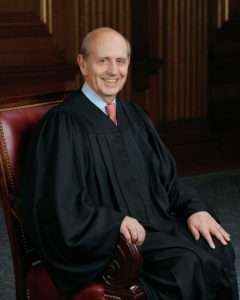The Volokh Conspiracy
Mostly law professors | Sometimes contrarian | Often libertarian | Always independent
Justice Breyer Warns Against Court-Packing
In this he echoes a number of other liberals, including the late Justice Ruth Bader Ginsburg.

In a recent virtual speech at Harvard Law School, liberal Supreme Court Justice warned against efforts to "pack" the Supreme Court in order to eliminate the current 6-3 conservative majority:
In a speech at Harvard Law School on Tuesday, Breyer said that the court's authority depends on "a trust that the court is guided by legal principle, not politics."
He added: "Structural alteration motivated by the perception of political influence can only feed that latter perception, further eroding that trust."
On this point, Breyer echoed the late Justice Ruth Bader Ginsburg, who spoke out against court-packing even more forcefully in 2019:
"Nine seems to be a good number. It's been that way for a long time," she said, adding, "I think it was a bad idea when President Franklin Roosevelt tried to pack the court…"
Roosevelt's proposal would have given him six additional Supreme Court appointments, expanding the court to 15 members. And Ginsburg sees any similar plan as very damaging to the court and the country.
"If anything would make the court look partisan," she said, "it would be that — one side saying, 'When we're in power, we're going to enlarge the number of judges, so we would have more people who would vote the way we want them to.' "
That impairs the idea of an independent judiciary, she said.
Ginsburg's fear that court-packing would undermine judicial independence and, thus, judicial review) strikes me as a more compelling concern than Breyer's worry that it would merely erode public confidence in the Court, though the two issues are obviously connected.
Breyer's critique of court-packing - like Ginsburg's before him - could potentially be dismissed as biased by self-interest. After all, any expansion of the size of the Court necessarily diminishes the influence of current Supreme Court justices. On average, a single justice on court with eleven or fifteen members has less clout than if the court's membership remains at nine.
But, in Breyer's case, such self-interested bias probably is not a major factor. The scuttlebutt in legal circles suggests he may well retire this year, in order to give Biden a chance to appoint a liberal successor while the Democrats still constrain the Senate. That, certainly, is what many liberals want him to do. Even if he chooses to stay on longer, Breyer surely knows that, at the age of 82, he probably does not have many more years left to serve. Thus, concern for his personal influence is unlikely to be the key factor in his opposition to court-packing.
Ginsburg and Breyer are far from the only prominent left-of-center critics of court-packing. I noted some other examples here.
I have written about the dangers of court-packing in greater detail here, here, here, and here, including addressing claims that it is an appropriate response to Republican skullduggery in the judicial nomination process, such as their hypocrisy in refusing to vote on a nomination in an election year in 2016, while pushing one through quickly just before the 2020 election. I also opposed an abortive conservative proposal to pack the lower courts back in 2017, which occasioned my first foray into this issue.
For reasons I summarized in January, it is unlikely that the Biden administration will push for court-packing in the near future, or that it can pass Congress even if Biden does make such a push. But, as explained in that same post, the idea has become a part of mainstream politics, and is unlikely to fully go away for some time to come.


Show Comments (22)